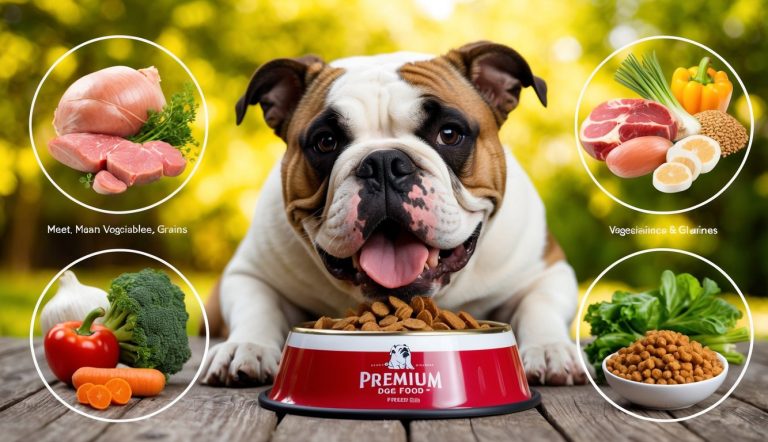Feeding your Bulldog the right food is crucial for their unique health needs and body structure. Bulldogs need about 1,300 calories per day if they’re active, but each dog is different. Your Bulldog’s food should have high-quality protein, digestible ingredients, and antioxidants to support their immune system. Their flat face and stocky build mean they need special consideration when it comes to kibble size and nutrient balance.
A nutritious diet designed for Bulldogs helps prevent common health issues and maintains their ideal weight. Look for foods with proper protein levels, healthy fats, and ingredients that support joint health, as these elements are essential for your Bulldog’s wellbeing.
Dietary Needs Specific to the Breed
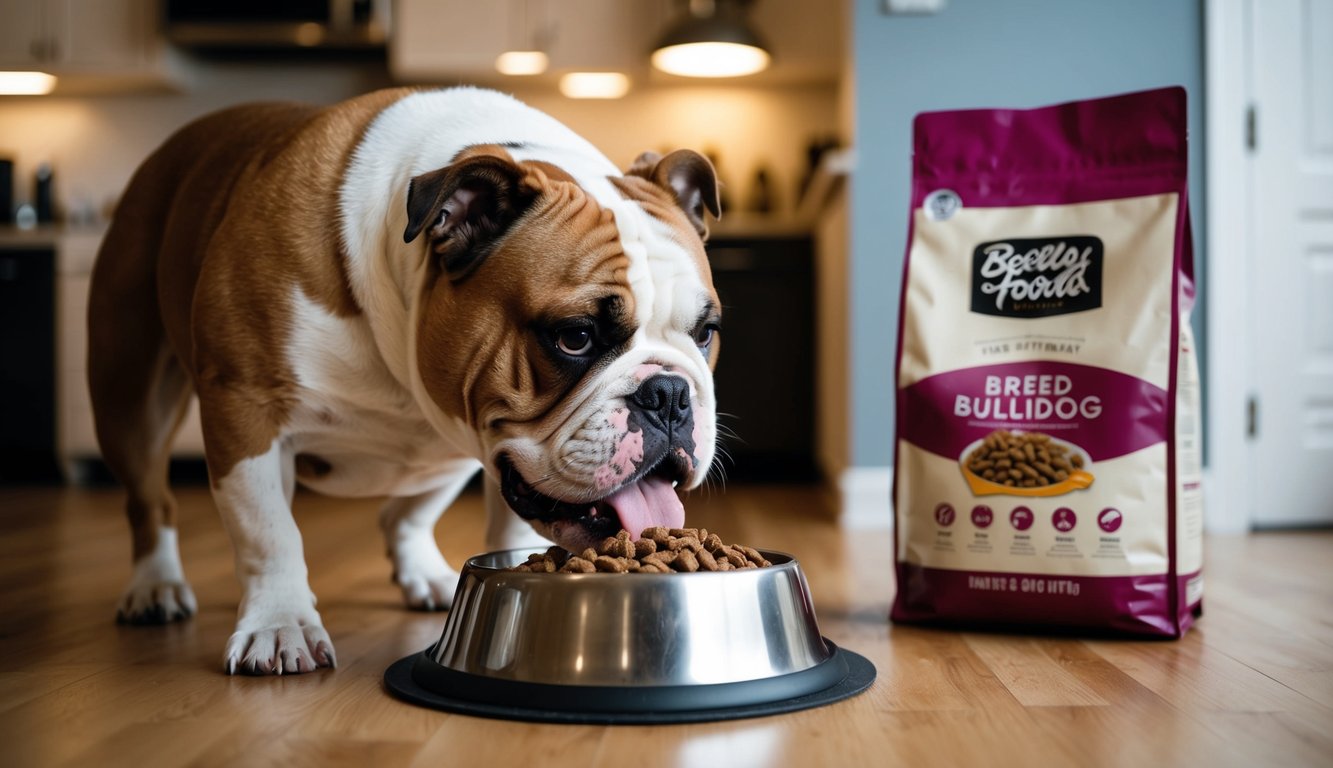
Bulldogs need special nutrition due to their unique body structure and common health challenges. A proper diet helps manage their weight, supports joint health, and reduces skin problems.
Size and Energy Level
- Bulldogs require specific portions based on their stocky build and moderate energy level. Adult bulldogs typically weigh between 40-50 pounds.
- They need fewer calories than similarly-sized active breeds to prevent weight gain. Your bulldog needs about 20-30 calories per pound of body weight daily.
- Exercise affects their food needs. Less active bulldogs need fewer calories, while those who play and walk more may need extra fuel.
Common Health Issues
- Your bulldog’s diet must account for their brachycephalic (flat-faced) structure, which can affect eating and digestion. They often deal with gas and sensitive stomachs.
- Many bulldogs have food sensitivities that cause skin issues or digestive problems. Watch for signs of allergies like itching or upset stomach.
- Joint problems are common in the breed. Extra weight puts more stress on their joints, making proper portion control essential.
Key Nutrients for the Breed
- High-quality protein supports muscle maintenance. Look for real meat as the first ingredient.
- Omega-3 and omega-6 fatty acids promote healthy skin and reduce inflammation. Fish oil is an excellent source.
- Glucosamine and chondroitin help protect joint health. Many bulldog-specific foods include these supplements.
- Probiotics and prebiotics aid digestion and reduce gas. These beneficial bacteria support gut health.
- Easily digestible carbohydrates provide energy without causing stomach upset. Sweet potatoes and rice work well for most bulldogs.
Best Food Options
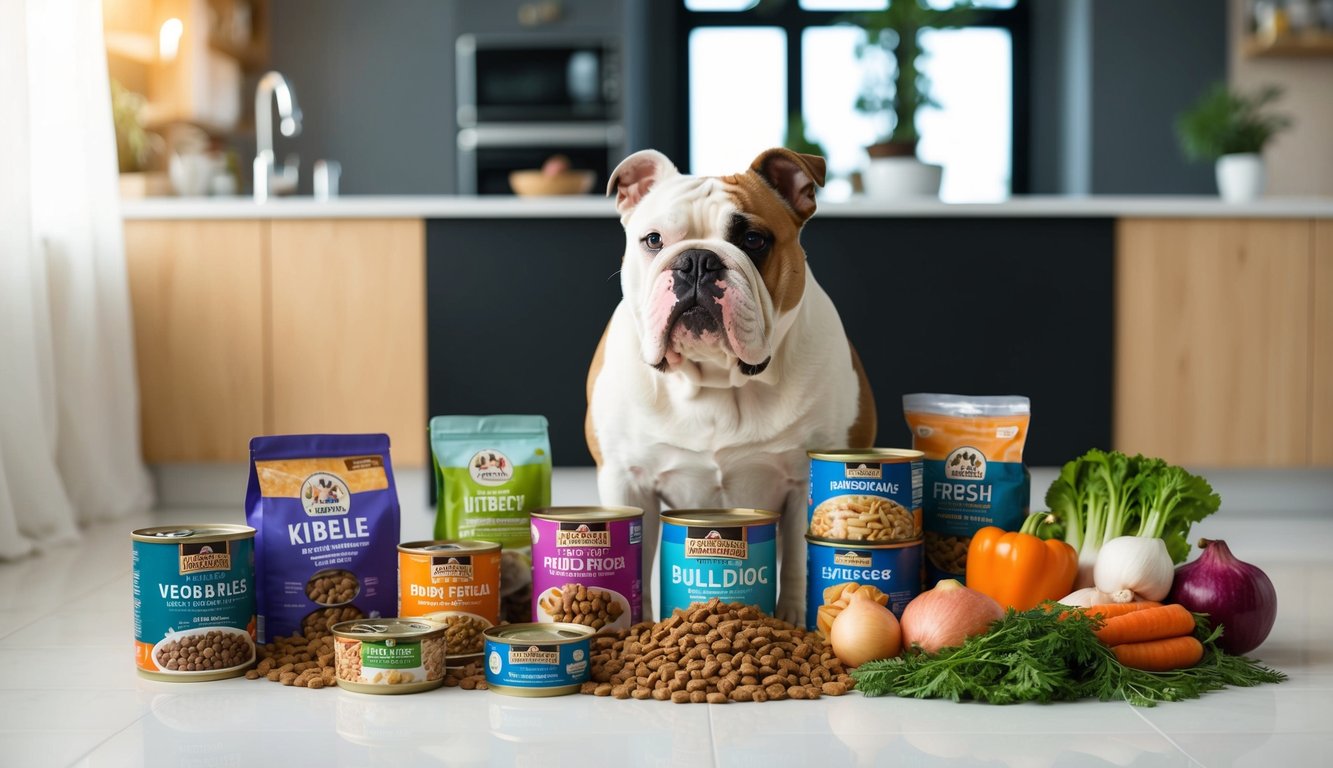
Bulldogs need specialized nutrition that supports their unique physical structure and helps prevent common health issues. High-quality proteins and balanced nutrients are essential for maintaining their muscle mass and joint health.
Farmers Dog: A Fresh, Human-Grade Option
Fresh, human-grade dog food provides your Bulldog with whole food ingredients that are easy to digest. The Farmers Dog creates personalized meal plans using real meat, vegetables, and essential nutrients.
Each meal contains natural ingredients like:
- Fresh chicken or beef as the first ingredient
- Nutrient-rich vegetables
- No artificial preservatives or fillers
- Customized portions based on your dog’s weight
The food arrives frozen and can be thawed as needed, ensuring freshness and maximum nutritional value.
Benefits of Fresh, Balanced Diets
Fresh diets support your Bulldog’s health through better nutrient absorption. Dogs eating fresh food often show improved:
- Coat shine and skin health
- Energy levels
- Digestive function
Fresh ingredients like salmon provide essential omega-3 fatty acids for joint health. Natural antioxidants from fruits and vegetables boost immune system function. Your Bulldog needs about 1,300 calories daily when active. Fresh diets make it easier to control portions and maintain a healthy weight.
Treat Options
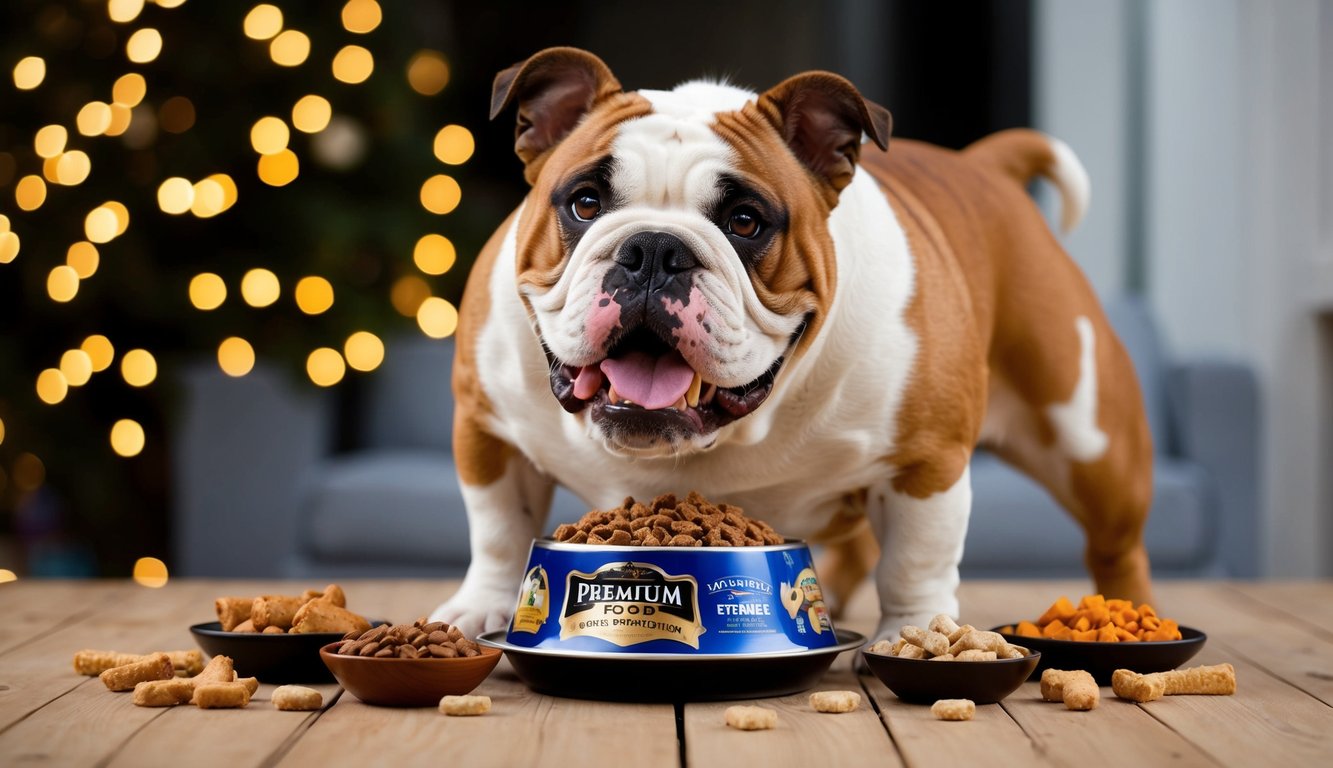
Choosing the right treats for your bulldog helps maintain their health while providing positive reinforcement. Treats should make up no more than 10% of their daily caloric intake to prevent weight gain.
Recommended Treats for the Breed
Grain-free treats made with real duck meat provide excellent protein without common allergens. Pick treats that contain simple ingredients and avoid artificial preservatives.
Fresh fruits and vegetables make great low-calorie options. Your bulldog can enjoy apples, berries, and mangoes as healthy snacks.
Look for treats with natural ingredients that support joint health, like those containing glucosamine and chondroitin, which is something Healthy Bite can offer you and your dog.
Treats for Training and Supplementation
- Small, soft treats work best for training sessions. Break larger treats into smaller pieces to extend their use during multiple training repetitions.
- Marrow roast treats with beef provide both entertainment and nutrition. These longer-lasting options keep your bulldog engaged while delivering beneficial nutrients.
- Watch for signs of food sensitivities. If your Bulldog shows any digestive issues or skin reactions, switch to limited-ingredient treats with novel proteins.
- Keep treats fresh by storing them in an airtight container. Discard any treats that show signs of spoilage or have passed their expiration date.
Places to Buy Online
Finding reliable places to purchase quality dog food online saves time and often costs less than buying from stores. Many online retailers offer auto-shipping options and bulk discounts.
Exclusive Offers and Promotions
You can save money by watching for deals and signing up for subscription services:
Common Discounts:
- 15-30% off first autoship orders, like similar to what The Farmer’s Dog offers.
- Bulk purchase savings
- Seasonal sales during holidays
- Email newsletter subscriber discounts
Many retailers give extra savings when you set up recurring deliveries. Pet food websites often run special promotions during Black Friday and Cyber Monday with significant discounts.
Feeding Guidelines
Proper feeding practices play a vital role in maintaining your Bulldog’s health. A consistent feeding routine with the right portions helps prevent obesity and digestive issues.
Tips on Portion Sizes
Adult Bulldogs need about 1300 calories daily when active. Adjust portions based on your dog’s weight, age, and activity level.
Daily Portion Guidelines by Weight:
- 40-50 lbs: 2-2.5 cups
- 50-60 lbs: 2.5-3 cups
- Over 60 lbs: 3-3.5 cups
Split these amounts into multiple meals. Measure food using a standard measuring cup to ensure accuracy. Watch your Bulldog’s body condition. You should be able to feel the ribs without pressing hard, but they shouldn’t be visible.
Feeding Schedules
Feed adult Bulldogs 2-3 times per day. Space meals evenly throughout the day.
Recommended Feeding Times:
- Morning: 7-8 AM
- Afternoon: 2-3 PM
- Evening: 7-8 PM
Keep fresh water available at all times. Remove uneaten food after 20 minutes to prevent overeating.
Transitioning to New Food
Mix old and new food gradually over 7-10 days to prevent digestive upset.
Transition Schedule:
- Days 1-3: 75% old food, 25% new food
- Days 4-6: 50% old food, 50% new food
- Days 7-8: 25% old food, 75% new food
- Days 9-10: 100% new food
Stop the transition if you notice signs of digestive issues. Return to the previous ratio and progress more slowly.
Conclusion
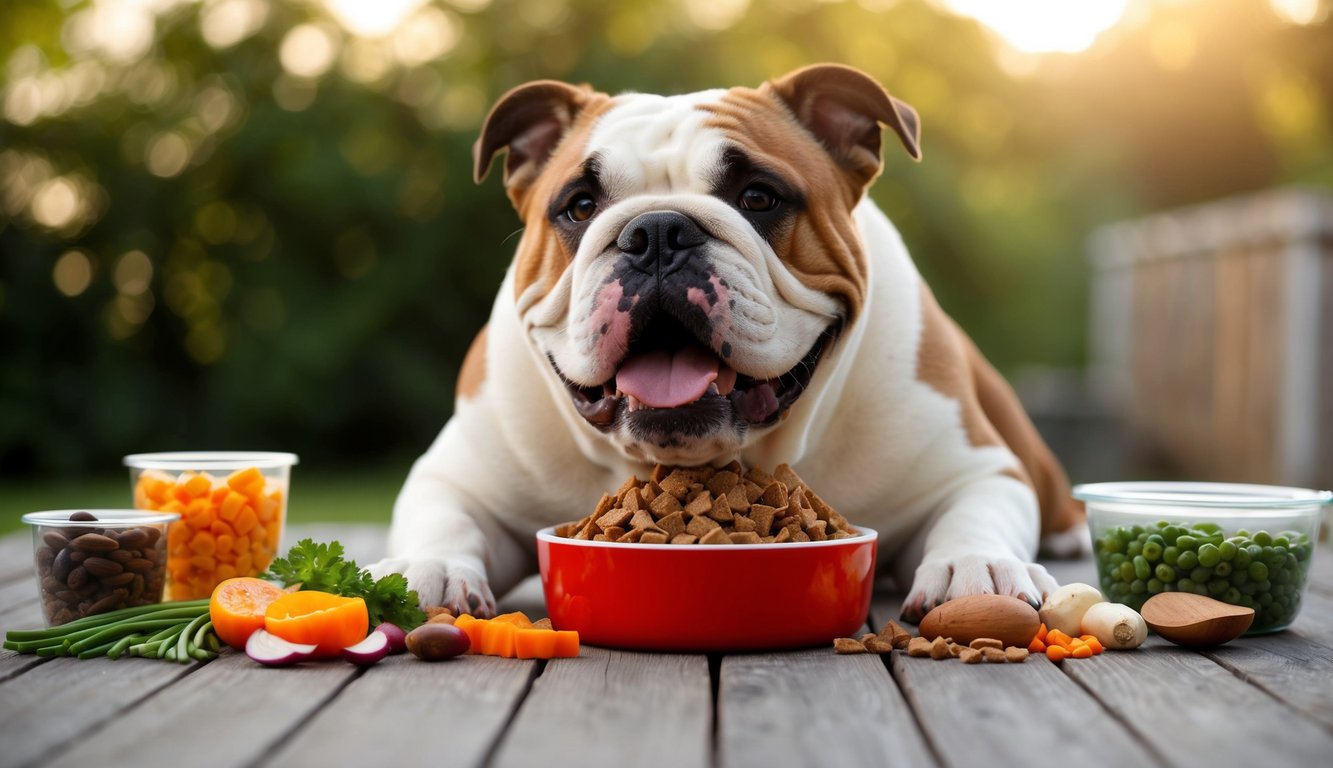
Choosing the right food for your Bulldog directly impacts their health, energy levels, and life quality. High-quality dog food designed for Bulldogs helps prevent common health issues and supports their unique dietary needs.
